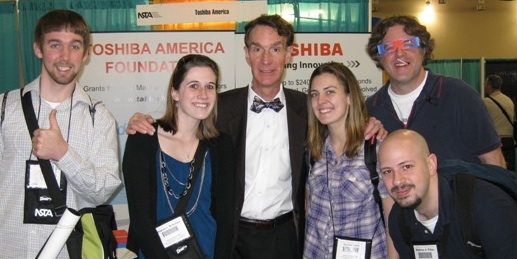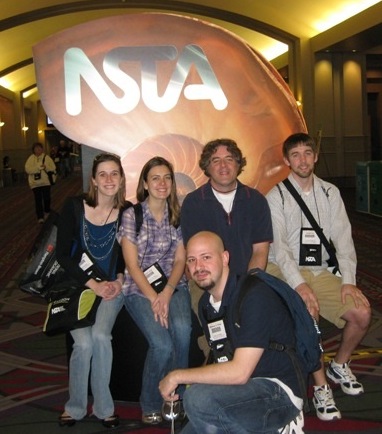BSE Science Education
BSE - programs in secondary science education
Millersville began in 1855 as the Lancaster County Normal School to prepare teachers. Millersville still maintains its emphasis on teacher education. Twenty percent of the graduates of the School of Science and Mathematics are secondary school teaching majors. Our education majors take the same courses as regular science majors, plus courses in the School of Education to be certified as teachers. The science departments offer supplementary one-credit pedagogy seminars that complement our upper-level courses and explore methods for teaching science.
The Commonwealth of Pennsylvania has identified the preparation of mathematics and science teachers as an area of high demand/need; there is a clear shortage of science and mathematics teachers in the Commonwealth. If you are interested in secondary school teaching, the faculty is prepared to be your mentors and introduce you to a career in teaching.
GETTING STARTED
Students interested in pursuing a Bachelor of Science in Education (BSE) degree that will lead to certification to teach secondary science need to choose a science discipline. Options at Millersville University include: Biology, Chemistry, Earth Science, and Physics. Students maintain a home in their chosen science discipline and take approximately 65 credit hours of science/math coursework and 33 credits in education plus additional general education courses.
For Info Contact:
Dr. Nanette I. Marcum-Dietrich
423 Stayer Hall
717-872-3827
nanette.dietrich@millersville.edu
The Biology-BSE degree leads to certification to teach biology at the secondary level in the public schools of the Commonwealth of Pennsylvania. The Biology-BSE curriculum is designed to be rigorous and challenging and to provide both depth and breadth of knowledge in Biology sufficient to allow our graduates to become outstanding teachers. Our philosophy is that because biology is a science that requires a basic understanding of the physical world as revealed by the physical sciences, our future biology teachers should have a solid grounding in the physical sciences. Thus, this program includes extensive coursework in Chemistry, Physics, and Mathematics. It also includes a strong liberal arts orientation.
The Chemistry-BSE degree leads to certification to teach chemistry at the secondary level in the public schools of the Commonwealth of Pennsylvania. Our American Chemical Society-approved programs of study offer students the opportunity for a basic and comprehensive study in the field of chemistry. Students benefit from a common core of courses that provide basic theory and skills vital for all degree programs leading to a bachelor’s degree in chemistry. All chemistry lectures, recitations, and laboratories are taught by eleven experienced faculty, all of whom hold Ph.D. degrees. The department's well-equipped laboratories give our students ‘hands-on’ training in the application and use of our equipment.
The Earth Science-BSE degree leads to certification to teach Earth and Space Science at the secondary level in the public schools of the Commonwealth of Pennsylvania. Our Department is dedicated to providing a rich student-centered learning environment focused on undergraduate education, and augmented by faculty research projects, internships, and cooperative educational experiences in which students are encouraged to participate.
The Physics-BSE degree leads to certification to teach Physics at the secondary level in the public schools of the Commonwealth of Pennsylvania. Millersville University has consistently ranked high among undergraduate institutions in the country in the number of enrolled physics majors. This enables the university to offer an exceptionally wide variety of upper-level and special topics courses. Furthermore, all physics lectures, recitations, and laboratories are taught by experienced faculty, all of whom hold Ph.D. degrees. Physics majors at Millersville are each assigned a faculty member within the department who advises them on coursework, research projects, graduate school selection, and careers.
PDS – Professional Development School
Increased time in the secondary classroom is an essential part of the development of an exemplary science teacher. MU believes that the preparation of tomorrow’s science teachers requires that our teacher candidates have strong content knowledge, a firm theoretical foundation, and meaningful experience in the secondary classroom so they can practice their craft. The Science Professional Development School (PDS) connects exemplary secondary science teachers, Millersville pre-service science teachers, and our Millersville University faculty in a full-year teaching partnership. During their senior year, MU pre-service science teachers serve as apprentices who fully engage in classroom teaching and learning. The PDS’s goal is to recruit a cohort of science teachers from local school districts to create a community of learners.
National Publications
- Marcum-Dietrich, N. & Dreon, O. (in press). Preparing beginning teachers to use instructional technology effectively. In A. D. Ritzhaupt & Swapna Kumar (Eds.) Cases on Educational Technology Implementation for Facilitating Learning. Hershey, PA: IGI Global.
- Dreon, O. & Marcum-Dietrich, N. (2012). Preparing and Supporting Teacher Development through Social Networking. In D. Polly, C. Mims & K. Persichitte (Eds.), Developing Technology Rich Teacher Education Programs. Hershey, PA: IGI-Global
- Marcum-Dietrich, N., Marquez, L., Gill, S., & Medved, C. (2011). No Teacher Left Inside: Preparing a new generation of teachers. Journal of Geoscience Education. (publication date Jan. 2011).
- Dreon, O., Marcum-Dietrich, N., & Ryder-Bertrand, J. (2011). Using Technology To Support Collaboration In Professional Development Schools. School-University Partnership. (publication date Jan. 2011).
- Dietrich, N. & Dreon, O. (2012). Participating in Change: Mentor-Teacher’s Perceptions of the Effectiveness of a Science Teacher Residency Program. American Educational Research Association (AERA). Vancouver, B.C.
National Presentations
- Marcum-Dietrich, N (2012). Improving STEM Teacher Education with a Residency Model. STEM Forum and Expo. Atlantic City, NJ.
- Marcum-Dietrich, N. & Dreon, O. (2012). Participating in Change: Mentor-Teacher’s Perceptions of the Effectiveness of a Science Teacher Residency Program. American Educational Research Association (AERA). Vancouver, B.C.
- Marcum-Dietrich, N. & Dreon, O. (2012). Implementing a Residency-model for Science
- Teacher Preparation. National Association of Research in Science Teaching (NARST). Indianapolis, IN.
- Marcum-Dietrich, N. & Dreon, O. (2012). Supporting Teacher Development Through Social Networking. National Science Teacher Association (NSTA). Indianapolis, IN.
- Dreon, O. & Marcum-Dietrich, N. (2012). Supporting Teacher Development Through Social Networking. American Association for Colleges of Teacher Education (AACTE). Chicago, IL.
- Marcum-Dietrich, N. & Dreon, O. (2010). The first-year teacher experience: stories of triumph and challenges. National Science Teachers Association (NSTA), Philadelphia, PA.
- Marcum-Dietrich, N., Dreon, O., & Long, E. (2010). From theory to action: Year one of a PDS. National Association of Professional Development Schools (NAPDS), Orlando, FL.
- Ross, P, Dreon, O. & Marcum-Dietrich, N. (2009). The First-Year Teacher Experience: Stories of Triumph and Challenges. National Science Teachers Association (NSTA), New Orleans, LA.

STUDENT ORGANIZATIONS
 In the past, Millersville University has been proud to sponsor a student chapter of the National Science Teacher Association (NSTA). This club hosted campus workshops for BSE pre-service teachers and presented at both state and national conferences.
In the past, Millersville University has been proud to sponsor a student chapter of the National Science Teacher Association (NSTA). This club hosted campus workshops for BSE pre-service teachers and presented at both state and national conferences.
Past Presentations
NSTA – National Convention
- Orlando, FL (2003) "Using multimedia presentations to enhance your classroom instruction"
- Philadelphia, PA (2003) "Differentiating your instruction of evolution using the power of technology"
- Philadelphia, PA (2003) "Teacher as researcher: Investigating one's own practice"
- Boston, MA (2008) "When words get in the way: Modeling Physics"
- Boston, MA (March 2008) “Writing to learn in science: A k-12 approach”
- New Orleans, LA (March, 2009) "The first year teacher experience: Stories of trial and triumphs"
- Philadelphia, PA (March, 2010) "Classroom symposium: A model of scientific talk"
- Philadelphia, PA (March, 2010) "The first year teacher experience: Stories of trial and triumphs"
- Philadelphia, PA (2010) "No teacher left inside: Using the outdoors as your science classroom"
- Indianapolis, IN (2012) " Model My Watershed: Modeling the Hydrology of Your Neighborhood"
- Indianapolis IN (2012) "Supporting Teacher Development Through Social Networking"
PSTA – State Convention
- Hershey, PA (2006) "Learning science through stories: a k-12 approach"
- Hershey PA (2006) "The use and understanding of language in physics and mathematical modeling"
- Hershey, PA (December, 2007) “Writing to learn in science: A k-12 approach”
- Hershey, PA (2007) "Teacher and student summer research opportunities at Millersville University"
- Hershey, PA (December, 2008) “Science demonstrations: A presentation by MU pre-service teachers" View on YouTube
- Hershey, PA (2008) "First year experience panel discussion"
- Hershey, PA (2011) "Learning science through demonstration"
-
7-12 Dual Certification
Coming Soon - Dual Certification in Special Education
Extend your year-long internship experience in Winter and Summer
Earn dual certification in your content area and special education
graduate in 4 years!
Find out more